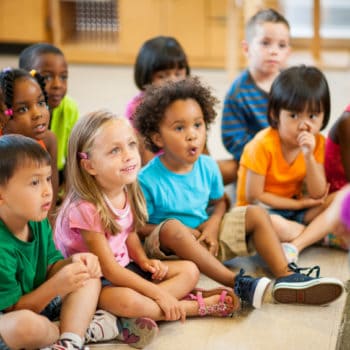Parents, nannies and other caregivers play a major role in preparing their child for kindergarten. But what qualifies a child as kindergarten ready? There is no easy answer as there are many factors and children develop in their own time.
Independence
Start by helping the child develop independence. Most kindergarten classrooms have one teacher and thus, kindergartners are encouraged to do some tasks independently. These tasks include blowing their nose, putting on their jacket, and washing their hands. Kindergarten readiness skills can also include being able to manage bathroom needs and being separated from parents without being upset. Prepare the child now by coaching him or her through these activities at home.
English Language Arts
Practice language development by spending 20 minutes reading every day, including both fiction and nonfiction. Through reading, you will introduce the child to new words, and they will hear the structure of the English language. Kindergarten readiness is achieved when the child can speak understandably, talk in complete sentences with five to six words, and look at pictures and tell stories. Kindergarten ready children can identify the beginning sounds of some words, identify some alphabet letters, recognize some sight words, recognize rhyming sounds, and listen to short stories without interrupting.
Math and Reasoning
Cognitive and reasoning skills are also important to practice. Using different toys, ask a child to help you sort and count the items. Kindergarten readiness is achieved when the child can sort objects by color, size, and shape and count to ten. Age-appropriate puzzles can help with shape and color identification.
Physical
Engage the child in meaningful art projects. Not only will this spur creativity, but it will help develop the child’s fine motor skills. Supervise the child as he or she uses child-safe scissors to cut different shapes. Practice how to make forms with play-doh, hold a pencil, and trace letters. For gross motor skills, practice playing catch and bouncing a ball. At this age, children should be able to pay attention for short periods of time with adult-directed tasks
Socialization
As children enter kindergarten, they will advance their social skills. At this age, children should understand actions have both causes and effects. They should show also understand general times of day. To prepare a child for kindergarten, talk to them about the importance of respect, sharing, being a good friend, and why it is important to follow the rules.
Young children change so fast – if they can’t do something this week, they may be able to do it a few weeks later. Readiness is acquired when most of the skills needed are mastered so that children can be successful and eager to learn when they enter the classroom. Talk to the child about the kindergarten schedule and how it might be similar to and different from preschool. This will help manage the child’s expectations and prepare him or her to start kindergarten successfully.
Nannies can learn more about kindergarten readiness by enrolling in the Intermediate Childcare certification program at the US Nanny Institute.


Recent Comments